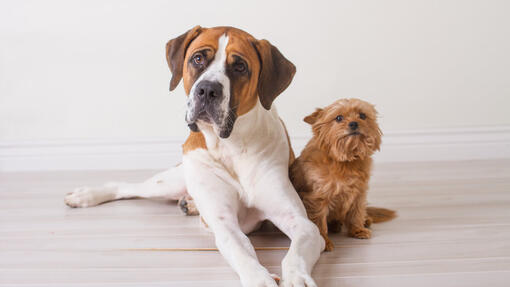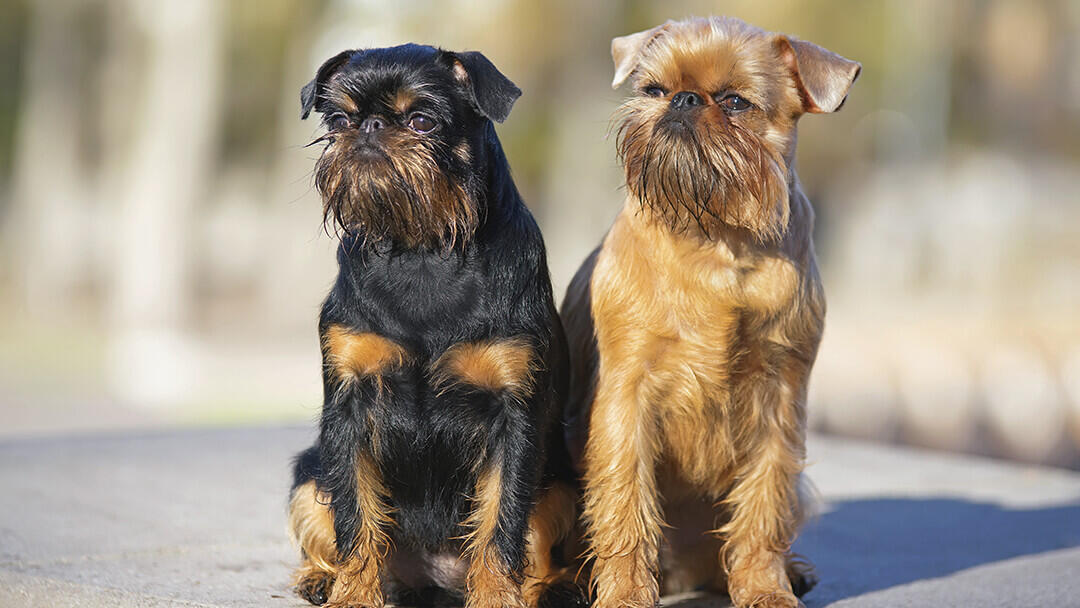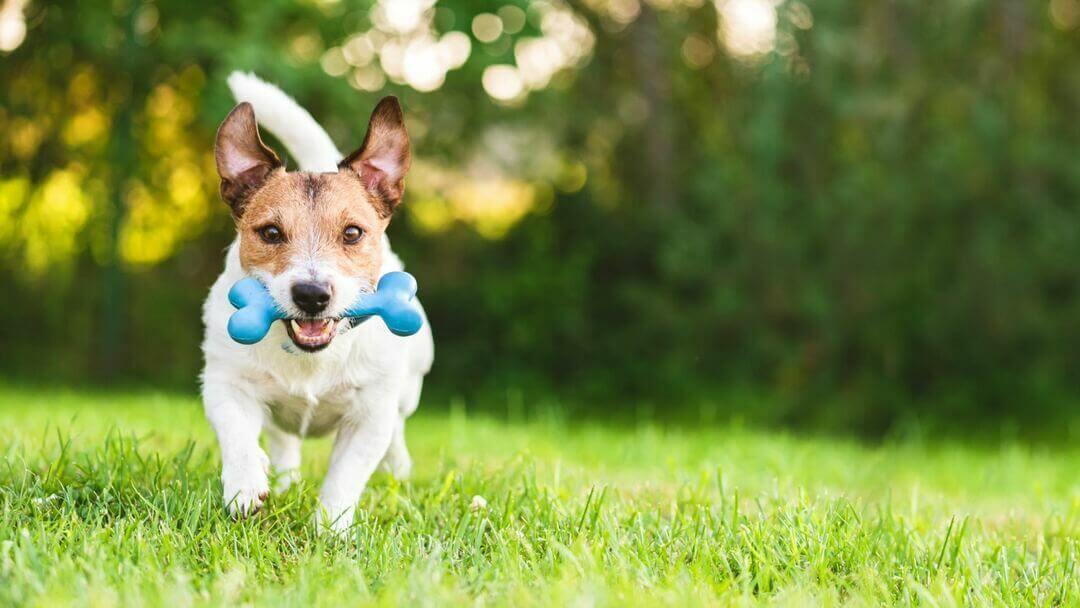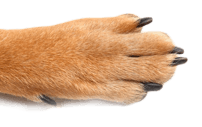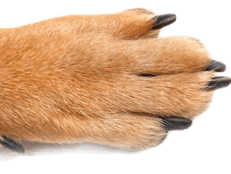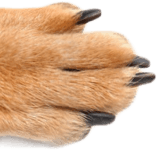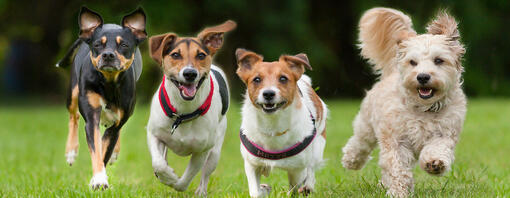
Pedigree, purebred, crossbreed, and mixed breed are all very common dog-related terms that, although meaning different things, get used interchangeably without a clear understanding of each one. For example, is a labradoodle a pedigree or a crossbreed? So, what is a ‘pedigree dog’ and does it matter if your furry companion isn’t one? Read on to get the answers to these questions and learn all about pedigree dogs.
What is a pedigree dog?
The general understanding of the term ‘pedigree dog’ is that this is a purebred dog recognised and registered by a Kennel Club so you will have a document from them that shows your dog’s ancestry going back several generations. This is their pedigree. However, having a record of parents and grandparents doesn’t mean that a dog is purebred. There are many examples of crossbreed dogs that have papers showing their parents’ Kennel Club pedigrees such as, for instance, F1 Cockapoos or Labradoodles.
Having a pedigree means that the dog, along with their parents, grandparents, great-grandparents etc were Purebred dogs officially registered with the Kennel Club, and you can trace their lineage (and any show titles they might have won) going back several generations. As many breeds have inherited health issues, being able to trace lines back can help you become more aware of your dog’s health situation and give more clues to any issues they might have inherited. A pedigree would be necessary if you want to show your dog in UK Kennel Club dog shows – including Crufts!
If you get your furry friend from a trusted breeder, they should be able to provide you with a pedigree certificate that shows your puppy’s family tree. Check this before you buy your puppy as if they don’t (and if not, why not?), it could possibly be a red flag that the dogs they are breeding might not be as purebred as they say! If you are 100% sure they have been registered with a Kennel Club (or you don't care whether they have or not), you can contact the Kennel Club and ask for the certificate yourself by submitting an application and paying a small fee.
Do purebred/pedigree dogs have any health problems?
All dogs can have health issues and there’s no guarantee that a pedigree dog will or won’t get sick – except for a few breeds whose health problems have become so severe that they are almost guaranteed. The advantage of buying a purebred dog however is that most known health problems can be tested for before the breeder decides to breed from their dogs and so the puppies will be less likely to develop them. If you are planning on buying a purebred puppy, do some research to see what health tests should be done – and make sure they are done and that you see proof of the results.
These conditions can affect bones/joints, eyes, skin, heart, teeth, and longevity – and this is one of the reasons you should always research not just your breed of choice but who you are getting a dog from and that they are responsible and ethical.
An advantage of buying a dog with a pedigree can be that they are being bred by responsible breeders who have the welfare of the breed at heart – rather than commercial breeders who have profit rather than health as their motivator, and so breed from less healthy and un-tested dogs – and possibly ones that aren’t purebred or registered. However, don’t rely on a pedigree to be a guarantee of health – a breeder doesn’t need to health test their dogs to get one!
Popular breeds are likelier to have increasing health problems due to bad breeding practices and this has become the case in several breeds, so it’s recommended to always make sure you’re contacting a trusted and reputable breeder when looking for a new dog.
To learn which breeds are more susceptible to health issues, check out our extensive and informative dog breed library – and also look at the Kennel Club website and the relevant breed club website.
How do I know if my dog is purebred?
There are three ways to get a good idea if your dog is a purebred or not. First of all is to have a Kennel Club pedigree certificate from the breeder – this is an almost certain guarantee – although the unscrupulous can find a convincing way round most things and there are a few forgeries out there! You could get a DNA test for your pup – and a good company with a large database from the country you live in can tell you what breed your dog is – or what breeds are in their ancestry.
And lastly you can compare your dog’s traits to those of their breed standard (and in countries where dog showing is popular but that don’t have a kennel club, this is often the way dogs are classified and accepted for shows).
Getting a pedigree from the Kennel Club is the quickest way but it relies on the dog being registered. There are plenty of purebred dogs who are never registered with the UK Kennel Club (or other kennel club around the world) so no pedigree doesn’t mean your dog isn’t purebred.
In this case, the DNA option is an easy way of finding out if your dog is a purebred or not. These tests are not 100% accurate (and sometimes breeds will appear in your dog’s DNA that you didn’t expect that are further back than would ever show up on a standard pedigree – so they are still classed as purebred) but they will show you the breed or breeds in your dog’s genetic make-up. This can be a fascinating exercise if you have a mixed breed dog as it can give you clues to your dog’s behaviour and personality.
Comparing with the breed standard if much more about guesswork – as when you cross two or more breeds, the results can sometimes look or behave nothing like either parent! Knowing what you can handle when choosing a dog of any breed is important, read our article on should I get a dog to find out more.
Purebred dog breeds
In total, there are about 221 pedigree dog breeds registered with the Kennel Club and this number increases almost every year. Are you wondering if your dog qualifies as a purebred – or has their characteristics? Check out this list of the seven groups of dog breeds as classified by the Kennel Club and see if your pup matches any of the breed group’s traits.
1. Working
Working dogs were bred to do a specific job and so are the canine specialists. This job is often to guard, protect, or rescue, meaning that these are often the most heroic canines out there – although they generally need experienced owners who understand their need to have a job. They’re known for their intelligence, agility, and independence which is why many serve as police or military dogs. These dogs include Dobermanns, Boxers, and Siberian Huskies.
2. Pastoral
Like the name suggests, pastoral dogs will do a great job of herding livestock all day, every day, in all kinds of climates. They often have thick coats, lots of energy, need plenty of exercise and training, and love being around people – think of Border Collies, Samoyeds, and German Shepherd Dogs.
3. Gundog
Originally trained to work with hunters to find or retrieve game, dogs in the gundog category are all great companions for any prospective owner who enjoys the outdoor life and plenty of exercise. They can be loving and have a sweet temperament, along with a lot of energy and a big love for games of any kind, as long as they get to run around and spend time with people or other animals. If you haven’t already guessed it, they’re some of the world’s most popular breeds and include Labrador Retrievers, Spaniels, pointers and setters.
4. Toy
These tiny canines make for great companions and the most perfect lap dogs. They’ll jump at any chance of attention and although toy breeds may be small, they can often be very protective. Toy breeds can become extremely devoted to their owners and want to follow them everywhere – to the point that many can’t be left alone. This group includes Chihuahuas, Maltese, and Bichons.
5. Hound
Hound dogs split into two types – scenthounds and sighthounds (depending on whether they hunt using their noses or their eyes). While affectionate and loving, hounds tend to look down on obedience, and their single-minded desire to chase something that is running or follow a scent for hours is still very strong – so while they need plenty of exercise, many need to be kept on leads unless in a totally secure place. Rarely safe with cats (although some can live happily with ‘their own’) and small furries. Hounds include the Beagles, Bloodhounds, Greyhounds, and Irish Wolfhounds.
6. Terrier
Enthusiastic about everything and as determined and courageous as they come, the terrier breed group were originally bred mostly as vermin hunters. This means that they are quick-thinking and quick-acting, brave, feisty, and have huge personalities despite their size. This group includes the Jack Russell, the West Highland White, and the Border Terrier.
7. Utility
This last category is a miscellaneous one that includes any other breeds that don’t quite fit the other groups – often because their job was so specialised, they are the only ones! Akitas, Chow Chows, Dalmatians, French bulldogs, and Poodles are all in this category.
What is the difference between pedigree dogs, crossbreed, and mixed breed dogs?
A pedigree is simply a record of a dog registered by the Kennel Club that shows their ancestry and shows their breed is pure.
A crossbreed dog means that the puppy’s parents were of two different breeds. This has resulted in the popularity of what are often called ‘designer dogs’ - such as Cockapoos, Labradoodles, Cavachons etc.
A mixed breed dog has parents of different breeds – often mixed breeds themselves.
At the end of the day however, having a pedigree doesn’t make your dog any better, any more loving, or any better behaved. It doesn’t make them a better companion or fit into your life any better. If you are considering getting a dog, pedigree or not, it is important to check if you and your family's lifestyle is the best fit. All dogs deserve a loving home and having a piece of paper showing who their ancestors were does not make them any more or less suitable to be your best friend.
The important thing is to make sure you’re picking the dog that best suits your lifestyle. If you’re unsure which breed to choose, check out our Dog Breed Selector that can help pair you with your ideal furry friend. You can also take our quiz to find out what type of dog owner are you.




